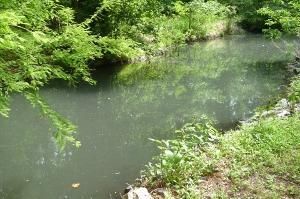Lepto-Spiro-What?
- posted: Nov. 03, 2015
Leptospirosis: Is Your Dog at Risk?
Leptospirosis is caused by several strains of bacteria of the group Leptospira. These bacteria are spread in the urine of animals such as rats, raccoons and skunks. Leptospirosis can affect both dogs and people with flu-like symptoms of lethargy, loss of appetite, vomiting and fever. However, it can also cause permanent and severe damage to the liver and kidneys if not diagnosed and treated in the early stages. Leptospirosis is treatable with antibiotics. Cats are rarely affected.
Leptospirosis is most commonly acquired by both people and pets by drinking from or swimming in infected ponds. But standing water of any kind, including backyard ponds or water features, puddles in city parks, puddles on streets or on farms can contain the bacteria and act as potential sources of infection. People can sometimes get leptospirosis from infected dogs if they contact the dog’s urine. Cases of leptospirosis are thought to be on the rise across the United States though this may be, in part, due to better methods of diagnosing the disease.
How can you protect your dog from leptospirosis? Limit contact with wildlife and with sources of standing or stagnant water and don’t allow your dog to drink from ponds or slow moving streams. Keeping rodent populations under control is also helpful, but be mindful that dogs and cats may also accidentally ingest rat and mouse baits and this can have serious or even deadly consequences for your pet, so make sure pets cannot access rodent baits if you are using them.
There is also a vaccination available to protect your dog. Dogs at high risk such as those who live on farms or who go hunting or camping should be vaccinated every six to twelve months. The leptospirosis bacterium is often combined with distemper, parvovirus and other viruses into one vaccine though a separate “lepto-only” vaccine is also available.
There are a few potential drawbacks to the vaccine. One is that only a few strains or serovars of the bacteria are included in the vaccine so it may not protect against all forms of leptospirosis, though some cross-protection is thought to exist. Second, the immunity provided by a leptospirosis vaccine may only last six to eight months, so, dogs in high risk situations may need to be vaccinated every six months to stay protected. Finally, a small number of dogs may have an allergic reaction to the leptospirosis vaccination. In most cases, it is a minor allergic reaction, but, if your dog has had a reaction to this vaccine, it will most likely be eliminated from her vaccine protocol.
Keep in mind that vaccinated dogs are almost never affected by leptospirosis, so we do strongly recommended that you vaccinate your dog annually unless he or she has had a vaccine reaction in the past.
While this illness is not diagnosed frequently, Patton Veterinary Hospital has had a few confirmed and suspect cases in the past, so it certainly does exist in the York area. Please keep your dogs safe by limiting contact with standing water and by visiting us regularly to keep your dog healthy and discussing whether your dog is at risk and how often he or she should receive the vaccine.
This Blog brought to you by the Patton Veterinary Hospital serving Red Lion, York and the surrounding areas.
Location
Patton Veterinary Hospital
425 E Broadway
Red Lion, PA 17356
